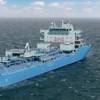Ground-Breaking Survey Reveals What Employees Think
The latest Maritime Employment Report from international specialist recruiter, Faststream, places a sharp focus on the gap that exists between perception and reality across the industry.
Not surprisingly, seafarers seeking a shore career tend to focus on the traditional and more accessible roles such as superintendent, fleet manager and harbour master. They perceive the more remote professions of law or insurance to be out of reach despite a large proportion of their shore based colleagues stating the importance of having a seafarer in the office. The report also reveals the gap between perceived and achievable starting salaries for mariners coming ashore after 10-15 years. Almost all underestimated how much they would be paid if they moved ashore to a related maritime role.
Elsewhere in the report, shore-based respondents were asked to comment on where future opportunities would lie and what they thought the pay differences were between regions. Interestingly, those in Europe and the US believed that they earned more than their Asian counterparts when the reality is somewhat different. Workers in the US and in Asia were largely happy with their earnings, whilst those in Europe were more disgruntled with their pay.
Other key findings from the report were:
- 69% of all respondents would follow the same career path again, if given a second chance – but only half of deck officers would.
- 92% of shoreside workers think it is at least “quite important” to have ex seafarers in the office, whilst 35% say it is vital.
- Engineering officers think it is much easier to get a job ashore that deck officers do.
- The least attractive shoreside professions to seafarers are in the legal, insurance and shipbroking sectors.
- 37% of maritime professionals think that SE Asia offers the best career opportunities over the next 10 years.
Commenting on the results, Faststream Group CEO Mark Charman said: “The maritime industry is complex for employees and employers alike and there are some surprising similarities and differences to be found in each region and each business sector. This ground-breaking report has thrown up some remarkable findings that will help employers better understand the employment landscape and plan their recruitment campaigns more effectively. There is a fine line between perception and reality and this report helps us understand some of the more obscure factors that influence the career choice of our potential employees”
Over 2000 shore and sea staff responded to this global survey and further perception-based reports will be published later in the year.














